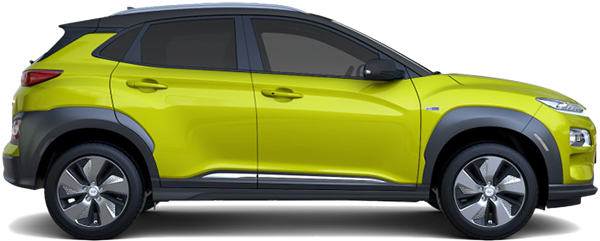The Comparative Analysis :
Hyundai Kona Electro (39,2 kWh) (18 - 19) vs. Ford EcoSport 1.0 EcoBoost (14 - 15)
€ 34,600

€ 19,000

€ 34,600
Base Price ⓘBase price of a new vehicle with standard equipment in Germany at market launch.
€ 19,000
ⓘBase price of a new vehicle with standard equipment in Germany at market launch. Price Info
Vehicle Dimensions
The dimensions of these vehicles differ considerably. The Hyundai Kona Electro (39,2 kWh) is 6.4 inches longer, 1.4 inches wider and 1.7 inches lower than the Ford EcoSport 1.0 EcoBoost.
Hyundai Kona Electro (39,2 kWh)
Ford EcoSport 1.0 EcoBoost
61.8
70.9
80.3
63.5
69.5
81
70.9 in
Width
69.5 in
80.3 in
Width Incl. Mirrors
81 in
61.8 in
Height
63.5 in
102.4
164.6
99.2
158.1
164.6 in
Length
158.1 in
102.4 in
Wheelbase
99.2 in
Vehicle Weight
Hyundai Kona Electro (39,2 kWh)
Ford EcoSport 1.0 EcoBoost
3549 lb
Curb Weight
2948 lb
4453 lb
Gross Vehicle
Weight
Weight
3814 lb

Weight Difference:
602 lb
16.96 %

General
Hyundai Kona Electro (39,2 kWh)
Ford EcoSport 1.0 EcoBoost
OS
Generation
JK8
Sport Utility Vehicle
Car Body Style
Sport Utility Vehicle
Electricity
Fuel Type
Mid-Grade Unleaded

Front-wheel drive
Drivetrain
Front-wheel drive

1-speed automatic transmission
Transmission
5-speed manual transmission
Engine
Hyundai Kona Electro (39,2 kWh)
Ford EcoSport 1.0 EcoBoost
Permanent magnet synchronous motor
Engine Type
Straight-three gasoline engine with turbocharger
0
Valves
4
0
Cylinders
3
0 L / 0 cu in
Displacement
1 L / 49 cu in
134 hp
at 0 rpm
Power
123 hp
at 6000 rpm
Hyundai Kona Electro (39,2 kWh)
134 hp
123 hp
Ford EcoSport 1.0 EcoBoost
291 lb‑ft
at 0 rpm
Max. Torque
125 lb‑ft
at 1400 rpm
Hyundai Kona Electro (39,2 kWh)
291 lb‑ft
125 lb‑ft
Ford EcoSport 1.0 EcoBoost
Performance
Hyundai Kona Electro (39,2 kWh)
Ford EcoSport 1.0 EcoBoost
96 mph
Maximum Speed
112 mph
9.7 sec
Acceleration 0 to 62 mph
12.7 sec
62 mph
62
mph
mph
443 ft
0.000 sec

Hyundai Kona Electro (39,2 kWh)
62 mph
62
mph
mph
577 ft
0.000 sec

Ford EcoSport 1.0 EcoBoost
▶ REPLAY
26.49 lb/hp
Weight-to-Power Ratio
23.97 lb/hp
Hyundai Kona Electro (39,2 kWh)
26.49 lb/hp
23.97 lb/hp
Ford EcoSport 1.0 EcoBoost
Fuel Economy / Emissions
Hyundai Kona Electro (39,2 kWh)
Ford EcoSport 1.0 EcoBoost
Fuel Economy
24 kWh✽
( 138 MPGe ⓘ Miles per gallon gasoline equivalent (MPGe) is a measure of the average distance traveled per unit of energy consumed. MPGe, specified in miles per U.S. gallon, is used to compare the energy consumption of vehicles that use different energy sources.)
combined ✽ per 100 miles
44 mpg
Hyundai Kona Electro (39,2 kWh)
138 MPGe
44 mpg
Ford EcoSport 1.0 EcoBoost
No data
city
36 mpg
No data
highway
50 mpg
39 kWh
Fuel Tank Capacity
13.7 gal
162 mi
Range
610 mi
Hyundai Kona Electro (39,2 kWh)
162 mi
610 mi
Ford EcoSport 1.0 EcoBoost
Environmental Impact
48.8 kWh
Total Energy Consumption
per 100 miles ⓘThe total energy consumption per 100 miles is the amount of energy consumed by a vehicle when burning fuel or using electricity per 100 miles (final energy), and the energy required to produce the appropriate amount of fuel or electricity (primary energy).
per 100 miles ⓘThe total energy consumption per 100 miles is the amount of energy consumed by a vehicle when burning fuel or using electricity per 100 miles (final energy), and the energy required to produce the appropriate amount of fuel or electricity (primary energy).
100.4 kWh
Hyundai Kona Electro (39,2 kWh)
48.8 kWh
100.4 kWh
Ford EcoSport 1.0 EcoBoost
Elektrofahrzeug
Emission Standard
Euro 6b (NEFZ)
0 g/mi (WLTP)
CO2 Emissions
206 g/mi (NEFZ)
Practical Convenience
Hyundai Kona Electro (39,2 kWh)
Ford EcoSport 1.0 EcoBoost
5
Doors
5
5
No. of Seats
5
904 lb
Maximum Payload
866 lb
9.4 cu ft
Trunk Volume
10.1 cu ft








31.5 cu ft
Cargo Volume (Seats Down)
35.1 cu ft















